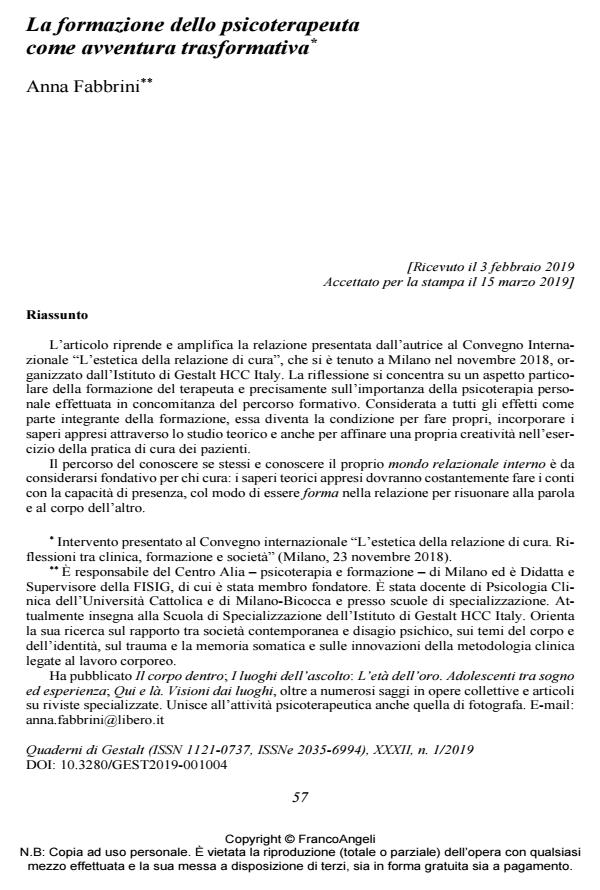The Psychotherapist’s Training as a Trasformative Adventure
Journal title QUADERNI DI GESTALT
Author/s Anna Fabbrini
Publishing Year 2019 Issue 2019/1
Language Italian Pages 15 P. 57-71 File size 227 KB
DOI 10.3280/GEST2019-001004
DOI is like a bar code for intellectual property: to have more infomation
click here
Below, you can see the article first page
If you want to buy this article in PDF format, you can do it, following the instructions to buy download credits

FrancoAngeli is member of Publishers International Linking Association, Inc (PILA), a not-for-profit association which run the CrossRef service enabling links to and from online scholarly content.
This paper refers to and amplifies the report presented at the International Conference "The Aesthetics of Therapeutic Relationship", held in Milan in November 2018 and organized by the Gestalt Institute HCC Italy. It focuses on a particular aspect of the therapist’s training, pre-cisely on the importance of personal psychotherapy carried out at the same time as the training course. It is believed that personal psychotherpay is not just an opportunity to deal with critical emergencies, relational or existential issues. Considered to all intents and purposes as an inte-gral part of training, this therapy becomes the condition for embracing, absorbing the knowledge learned through the theoretical study and also for refining a own creativity in the implementation of patients care practice. Returning to the paradigm of the dialogical structure of the internal world, the close link between the opening of field to oneself and the principle of relationality, of contact, of between us experience - keystone of gestalt work - is highlighted. As bearers of contacts matrices, in accordance with the law of isomorphism - identity of form - individuals manifests themself in the external contact resonating with their own internal contacts. The specific responsibility of the therapists establishes its roots on this point; they will be able to decipher the other, their speech and their feeling, only through the codes and filters that they have incorporated. The path of knowing themselves and knowing themselves internal relational world is therefore to be considered fundamental for anyone who cares: the learned theoretical knowledge will con-stantly have to deal with the capacity of presence, with the way of being shape in the relation-ship to resonate in the word and the body of the other. The text analyses some of the experiential knowledge necessary for the person who cares, in order for them to tune into the therapeutic relationship: the knowledge of contact and differ-ence, the knowledge of their own history and the knowledge of their own body. These are the condition to refine the empathic listening, the dialogical competence and to sustain an attitude of spontaneity as a creative use of the theoretical knowledge combined with knowlegde of themselves. Some reflections are also proposed about the care of setting as a protective meas-ure of the psychotherapist against the emotional burden resulting from contact with patients’ suffering.
Keywords: Inner dialogue, contact, boundaries, difference, body, spontaneity.
- Un filo continuo nello spaziotempo della formazione relazionale Ilaria Genovesi, Simona Vatteroni, Francesca Deri, Emanuela Laquidara, in RIVISTA DI PSICOTERAPIA RELAZIONALE 59/2024 pp.45
DOI: 10.3280/PR2024-059003
Anna Fabbrini, La formazione dello psicoterapeuta come avventura trasformativa in "QUADERNI DI GESTALT" 1/2019, pp 57-71, DOI: 10.3280/GEST2019-001004